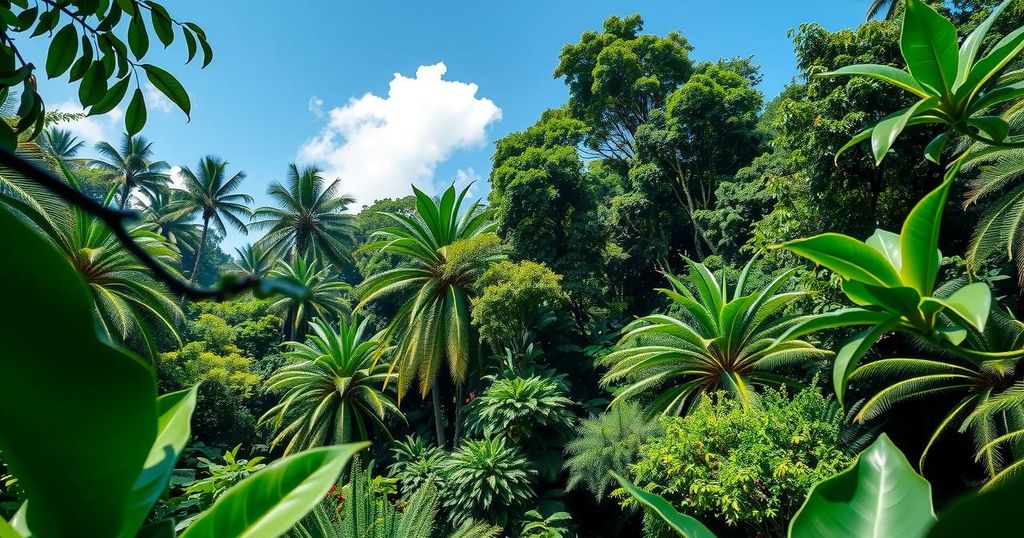Gabon Elections: The Rise of Brice Clotaire Oligui Nguema and Prospects for Democracy
Brice Clotaire Oligui Nguema, Gabon’s coup leader, is seeking election as the country’s first new head of state since the Bongo family dynasty. His popularity is bolstered by public discontent with the previous regime, and his campaign emphasizes modernization and reform. As he prepares for potential victory, he faces the significant challenge of meeting public expectations for change and sustainable development.
Gabon is preparing for elections following a coup that ended a longstanding Bongo family rule. This unprecedented transition is spearheaded by Brice Clotaire Oligui Nguema, the coup leader who has pivoted from military authority to a political contender. Outfitted in a politician’s suit, he faces seven candidates, with expectations that he will command a significant majority due to his popularity and certain electoral regulations that have disqualified notable rivals.
Oligui Nguema’s campaign, branded under his initials “C’BON,” resonates positively with the populace. His principal opponent, Alain-Claude Bilie-By-Nze, represents the old regime and lacks the backing of significant political factions. Winning the election would confer upon Oligui Nguema a seven-year mandate, enabling him to pursue modernization and developmental reforms, diminishing the influence of crises-ridden neighboring countries.
With a modest population of 2.5 million, Gabon is a vital oil producer and ranks second globally in manganese exports. The nation benefits from its rich biodiversity and has enjoyed a relatively stable history apart from a major crackdown in 2016. Following the coup on August 30, 2023, Oligui Nguema’s administration was welcomed by many Gabonese who were weary of the Bongo dynasty.
The former regime’s reported electoral fraud intensified dissatisfaction among the people, leading to an unopposed military intervention. Oligui Nguema seized this opportunity to expand his support base by including former government members and critics into his transitional administration. He has refrained from employing the repressive tactics familiar to military leaders in other African nations.
In contrast to the anti-Western tendencies of other regional leaders, Oligui Nguema has taken diplomatic measures to secure international relations and ensure a prompt return to civilian governance. His government recently partnered with France to redefine military collaborations, showcasing a commitment to international stability and cooperation.
Oligui Nguema’s initiatives to stimulate public works resonate with citizens’ aspirations, leading to favorable public sentiment as he engages in projects that benefit Gabon’s infrastructure. Despite borrowing on the regional market, he has appropriately managed investor relations and successfully navigated external financial challenges.
Upon assuming office, Oligui Nguema will confront pressing societal challenges, particularly in securing the prioritization of environmental conservation alongside economic development. Balancing the exploitation of Gabon’s rich resources against rural community interests is vital, especially as urban populations demand improved living conditions and opportunities.
With the political landscape shifting, the anticipation for Oligui Nguema’s performance is palpable, as notable political figures who once opposed the Bongo regime may play crucial roles in his administration. However, the burden of delivering on public expectations will rest heavily on his shoulders, marking the initiation of his most considerable endeavors.
In summary, Brice Clotaire Oligui Nguema’s transition from coup leader to an electoral candidate symbolizes a critical moment for Gabon. This upcoming election seeks to redefine governance after a protracted era under the Bongo family. Oligui Nguema’s strategic alliances and public approval position him favorably, yet he faces significant challenges in responding to the populace’s aspirations for environmental stewardship and socio-economic development. The successful navigation of these complexities will be critical to his legacy as the new leader of Gabon.
Original Source: www.bbc.com




Post Comment